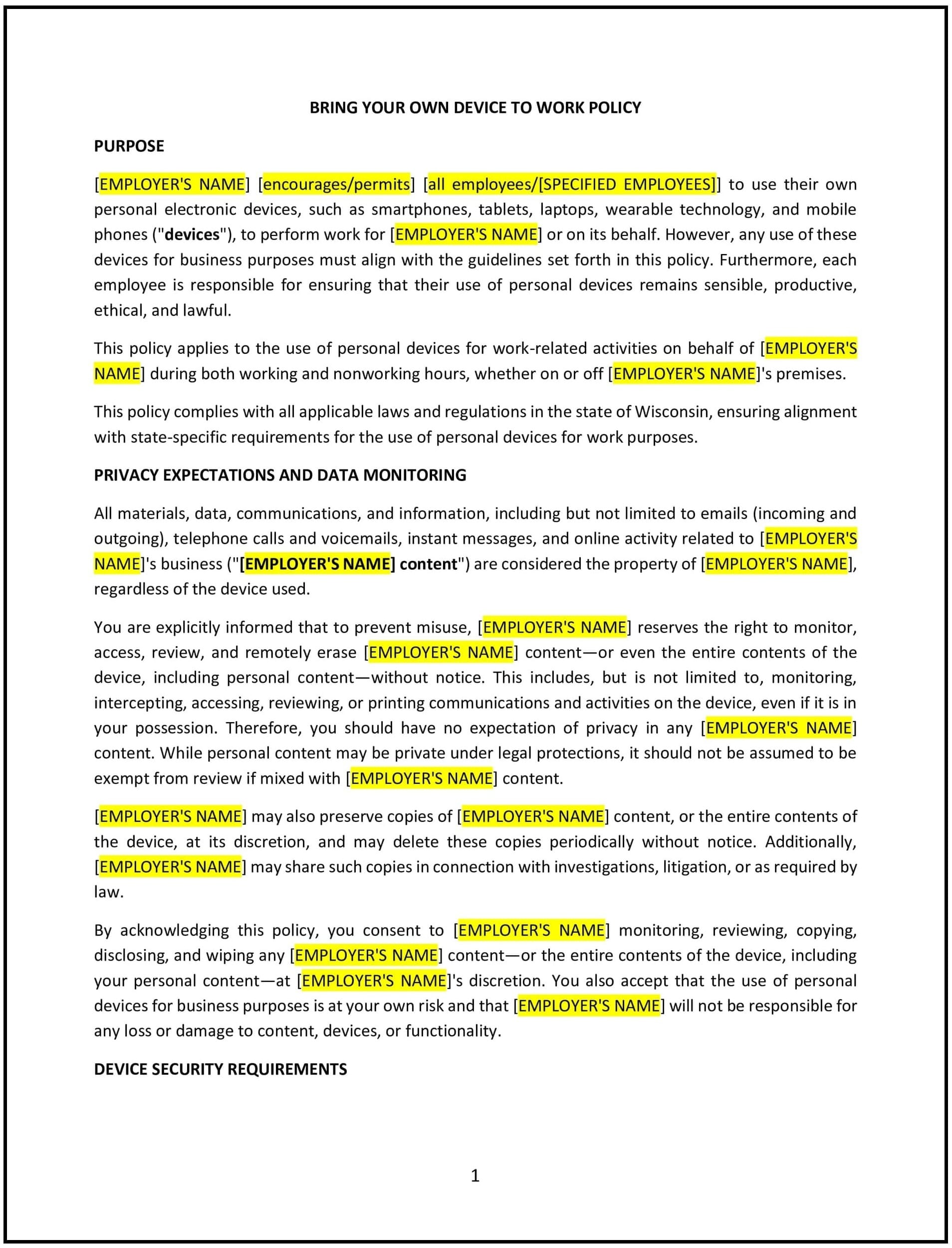Bring your own device to work policy (Wisconsin): Free template
Got contracts to review? While you're here for policies, let Cobrief make contract review effortless—start your free review now.

Customize this template for free
Bring your own device to work policy (Wisconsin)
A bring your own device (BYOD) to work policy helps Wisconsin businesses establish clear guidelines for employees who wish to use their personal devices (e.g., smartphones, laptops, tablets) for work purposes. This policy outlines the rules for using personal devices to access company systems, protect company data, and ensure security while maintaining employee privacy.
By implementing this policy, businesses can provide flexibility for employees to use their preferred devices while safeguarding sensitive company information and minimizing security risks.
How to use this bring your own device to work policy (Wisconsin)
- Define acceptable devices: Specify which types of devices are permitted for use in the workplace, such as smartphones, laptops, tablets, or any other personal devices. Ensure that only devices that meet company security standards are allowed.
- Set security requirements: Establish clear security guidelines for personal devices, including the use of strong passwords, encryption, and security software (e.g., antivirus programs). Specify whether employees must install company-approved apps or software for secure access to company data.
- Protect company data: Outline the measures employees must take to protect company data on their personal devices, such as using secure connections (VPNs), preventing unauthorized access, and ensuring that company information is not stored on personal devices without adequate protection.
- Establish data ownership: Clarify the company’s ownership of the data accessed or stored on personal devices while employees are using them for work purposes. Ensure employees understand that company data remains the property of the business, even when accessed on personal devices.
- Define usage expectations: Specify when and how personal devices can be used for work purposes (e.g., during work hours, while on company premises, or for specific tasks). Set expectations for how personal and work-related tasks should be separated on devices to avoid misuse or distractions.
- Implement monitoring protocols: Outline any monitoring that may be conducted on devices used for work, including the monitoring of emails, communications, and other work-related activities. Ensure employees are aware of what data the company may access and how it will be used.
- Address loss or theft: Specify the steps employees must take if their device is lost or stolen, including reporting it immediately to the company, remotely wiping data if possible, and taking steps to secure company information.
- Provide technical support: Define the level of support the company will provide for personal devices, including troubleshooting, software updates, and security patches, and any limitations to the support employees can expect.
Benefits of using this bring your own device to work policy (Wisconsin)
This policy offers several benefits for Wisconsin businesses:
- Increases flexibility: Allowing employees to use their personal devices gives them more flexibility and can improve their work efficiency by enabling them to work from multiple locations.
- Reduces hardware costs: By allowing employees to use their personal devices for work, the company can reduce the cost of purchasing and maintaining company-owned devices.
- Enhances productivity: Employees are more likely to be comfortable using their own devices, which may lead to increased productivity and smoother workflows.
- Improves employee satisfaction: Providing employees with the choice to use their personal devices can increase job satisfaction, as employees can work with tools they are familiar with and prefer.
- Strengthens security: Setting security standards for personal devices helps mitigate risks associated with unauthorized access to company data, ensuring that sensitive information remains protected.
Tips for using this bring your own device to work policy (Wisconsin)
- Communicate the policy clearly: Ensure all employees are aware of the BYOD policy and understand the rules regarding security, data protection, and acceptable use of personal devices.
- Enforce security standards: Regularly review and enforce the company’s security protocols for personal devices, such as requiring device encryption and the use of company-approved security software.
- Offer training: Provide training to employees on how to secure their devices, protect company data, and report security breaches or lost devices.
- Separate work and personal data: Encourage employees to keep work-related and personal data separate on their devices, either through the use of separate apps, profiles, or data encryption.
- Review periodically: Regularly review the policy to ensure it remains compliant with Wisconsin laws and reflects changes in technology, employee needs, or business practices.